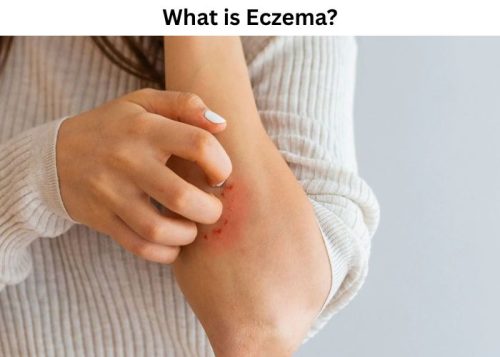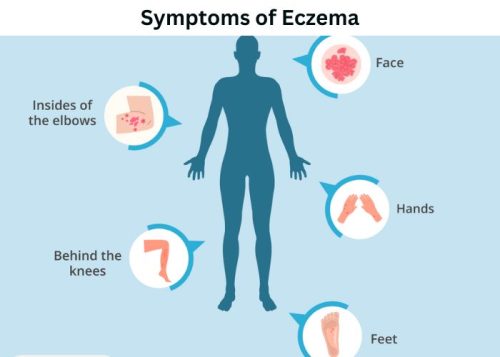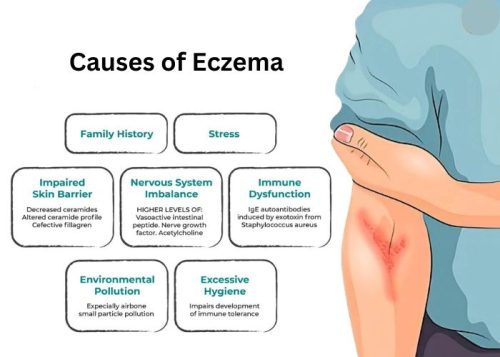
Causes of Eczema and How You Can Prevent It?
Eczema, also known as atopic dermatitis, is an issue that makes your skin red, dry, scaly, and sometimes swollen. It’s not something that comes and goes on a single time. It generally comes and goes in flares. Some only have mild eczema, but others might have more prominent symptoms that can disrupt sleep and daily comfort.

Symptoms of Eczema
Eczema is a skin condition and may have varied symptoms based on age, location of the body, and severity. It will generally occur and remit in a cycle, sometimes for a while worsening and then improving. Being aware of the initial signs allows you to better control it.
- Dry Skin
Skin becomes rough, flaky, or scaly. It will be tight or cracked, particularly during cold weather.
- Itching (Pruritus)
This is the most usual and annoying symptom. The itching is either light or severe, usually worsening at night. Scratching can make the condition worse or cause an infection.
- Red or Swollen Skin
The areas involved can become red or darker than your normal skin color, depending on your skin tone. It is usually warm to the touch.
- Patches or Rashes
Small patches or bumps can form on the skin. They can become painful, raw, or sensitive after scratching.
- Thickened or Hardened Skin
The skin can thicken, become rough, or leathery due to repeated scratching — this is referred to as lichenification.
- Oozing or Crusting
In some cases, the rash is oozing clear fluid or has yellowish crusts. This can be an indication of infection and requires medical treatment.
- Skin Discoloration
Over time, eczema may lead to dark or light patches after a healing process in individuals with darker skin.
Common Areas Affected:
- Elbows and behind knees
- Hands and wrists
- Face, particularly cheeks (in children)
- Neck and upper chest
- Ankles and feet

Causes of Eczema
Eczema is not caused by one thing. Often, it occurs because of a combination of what’s going on inside and outside the body. Knowing why eczema causes can assist you with taking better care of your skin and preventing flare-ups.
- Family History (Genetics)
If one of your relatives has eczema, asthma, or hay fever, then you might get atopic dermatitis. It is hereditary and can begin early in life.
- Weak Skin Barrier
Healthy skin serves as a barrier against germs and holds water. In eczema, the integrity of the skin barrier is compromised. This implies that water can leak and allergens like dust or chemicals enter the skin very easily.
- Overactive Immune System
Individuals with eczema have an overactive immune system that overreacts to minor stimuli. This causes inflammation, redness, and itching.
- Environmental Factors
Cold air, dry air, pollution, sudden changes in temperature, sweating, and spending long periods in air-conditioned spaces can worsen atopic dermatitis.
- Irritants and Allergens
Household products such as soaps, shampoos, detergents, perfumes, and even some fabrics (such as wool or man-made materials) can cause skin irritation. Others also react to food allergens like milk, nuts, or eggs.
- Stress
Stress is not an etiology of eczema, even though stress does make it worse. Flares can result from mental tension in adults.
- Changes in Hormones
Eczema occurs in some individuals with hormone changes, such as menstruation or pregnancy. Hormonal fluctuation influences skin sensitivity and dryness.

Homeopathy Treatment for Eczema
Homeopathy treatment is where many turn to treat eczema from its origin. Rather than simply curing the skin, homeopathy aims at the overall balance of the body. The aim is to enhance natural immunity and healthy skin.
- Graphites: Helpful when the skin is dry and cracked.
- Sulphur: For severe itching and burning.
- Rhus Toxicodendron: Beneficial when eczema worsens during cold, wet weather.
- Mezereum: For thick crust eczema with oozing.
Disclaimer
Homeopathy treatment for eczema has to be given under the supervision of a doctor. The results may be influenced by personal symptoms and medical conditions.
Prevention of Eczema
Although atopic dermatitis cannot be completely cured, you can avoid or minimize flare-ups with proper care. Here are easy but effective tips for the prevention of eczema:
- Keep Skin Moisturized
Apply a mild, fragrance-free moisturizer twice a day. Use immediately after bathing to seal in moisture.
- Avoid Triggers
Observe what triggers your eczema. It may be a certain soap, cleaner, food, or even stress. Staying away from them will stop flare-ups.
- Select Gentle Clothing
Use cotton clothes rather than coarse or tight materials such as wool or nylon. Soft clothing reduces irritation of the skin.
- Have Short, Lukewarm Showers
Hot water dehydrates the skin. Use lukewarm water and mild, fragrance-free soap.
- Control Stress
Stress can make eczema worse. Practice simple things like yoga, deep breathing, or just walking regularly.
- Hydrate Yourself
Drink plenty of water every day. It keeps your skin healthy from within.

Is Eczema a Fungal Infection?
No, eczema is not caused by a fungus. Fungus infections result from fungi, whereas atopic dermatitis is caused by immune disorders and skin barrier defects. Still, scratching of the skin might cause infections that might resemble them. That’s why proper management and early intervention are necessary.
Patient Testimonial for Eczema
I had eczema for a couple of years. It got worse in winter, and I couldn’t sleep due to itching. Steroid creams would only give me relief for a few days. Then I visited a homeopathy clinic. The physician asked me about my lifestyle, stress, and even diet. After 2 weeks of medication, my skin started to improve. Now it’s been a year, and I haven’t had a single bad flare-up. I am sincerely grateful for this long-term and safe solution.
Consult with Dr. Deepika
Dr. Deepika, the best homeopathy doctor in Noida, has extensive experience in curing chronic skin diseases such as eczema. She provides individualized care, safe homeopathy treatment, and long-term holistic healing.